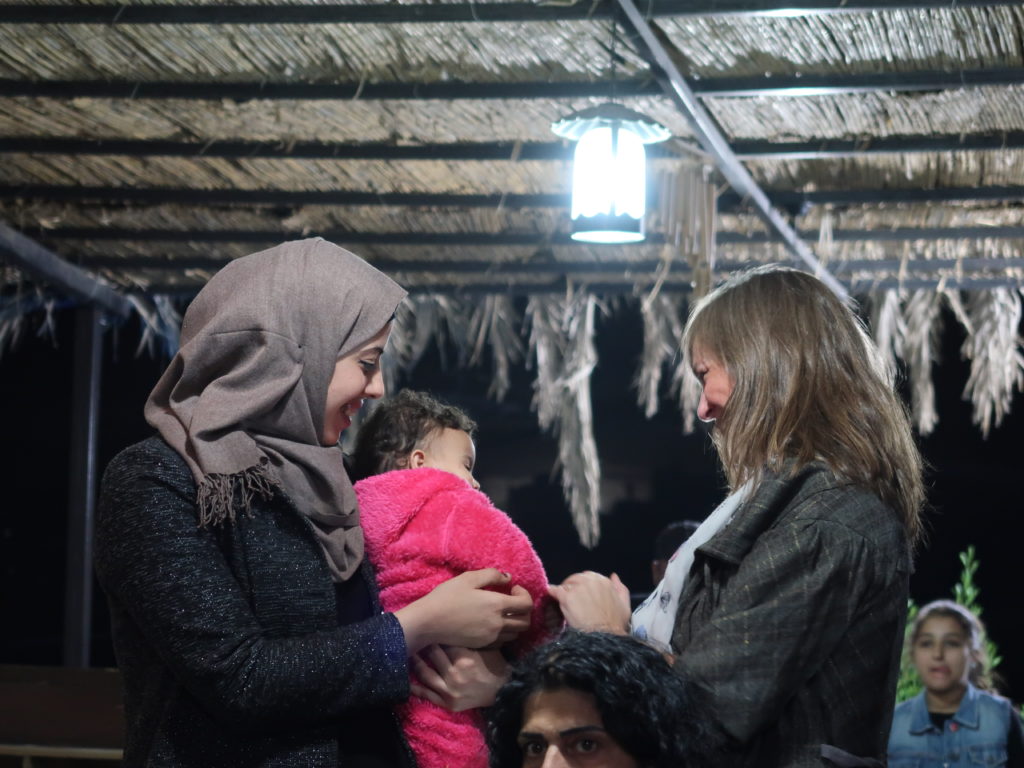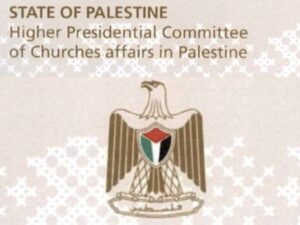A conspiracy with the God of Hope

By Jennifer Henry
I have rarely seen anything as beautiful as the group of women and children who gathered to meet the KAIROS delegation in Thabra in the West Bank. About thirty women and young children, all so incredibly welcoming with smiles and handshakes, greeting our delegation of ten Canadian church leaders and staff to Palestine and Israel… They told us later that international folk rarely visit, and if they do, it is certainly not to listen to women living under occupation.
This was the first of four meetings with women’s groups supported by KAIROS and led by Lucy Talgieh, Women’s Project Coordinator of Wi’am: Palestinian Conflict Transformation Center. In Thabra the surroundings were meagre. Chairs were a recent addition, paid for from a staff person’s own pocket. But the hospitality was generous and the conversation animated and powerful. And the children…well, they warmed every heart.
They were anxious to share. They told us about how they are solving local garbage collection issues and strategizing to improve access to health services. The nearest clinic is a very long walk away and not always open. The women spoke proudly about how they were learning about their rights, including the Convention on the Elimination of Discrimination Against Women, and what a difference it was making in both their capacity to protect themselves from violence, and in the possibility of moving towards greater leadership in their communities.
Here in the West Bank, the occupation means misery and terror. That day we also visited Beit Umar, where we met a woman who has five imprisoned sons. Most of the women in that group had at least one relative in prison. The constant presence of heavily armed Israeli soldiers makes them fear for their children as any move that can be perceived as provocative can trigger a lethal response or lead to immediate detention. Many spoke of ever more aggressive restrictions on access to land and agriculture. All face ongoing humiliation and challenges moving about the area. Lack of consistent access to employment or even to basic needs such as clean water are daily hardships. Even as visitors, our delegation risked settling into despair as we listened to the women’s stories.

As a delegation of Indigenous people, settlers and newcomers, the commonalities between the struggles in this contested place and in Canada and other countries were not lost on us. Dispossession, lack of access to basic services, restrictions on movement, loss of control over resources, violence, particularly against women – these are common experiences in Indigenous communities the world over, an acknowledgement that was always unsettling.
And yet, what we experienced in these women’s groups, in Thabra and Beit Umar, and others in Jericho and Bethlehem, was pure hope. They said it themselves. In Beit Umar, one of our delegates asked where the women found their hope in the face of the relentless injustices of the occupation. This group of largely Muslim women responded, “Our faith inGod of course.” Mariam added, “This is what gives me hope – this place where we come together as a group to heal, train, learn, have fun together, and empower ourselves.” Here women’s empowerment is in a conspiracy with the God of Hope.
Days later, I can’t help but reflect on the theological and moral significance of what Mariam said. What is hope if it isn’t coming together? Coming together to embolden one another in the face of grief, loss and despair. Coming together to borrow energy, optimism, possibility when you can’t find it alone. Coming together to be stronger than one person can be, something even more than the sum of our parts. Being together as a diverse delegation nurtured hope; being together with our hosts across these beautiful, aching lands confirmed hope.
Maybe it was unexpected, but this day we came to the West Bank and saw, heard, and yes, even tasted, hope in Arabic coffee and olives, warm bread and zaatar. We dreamed of ways that these women who gather in the West Bank to create hope and build alternatives could meet women gathered in Canada in Indigenous or migrant communities. We know they would recognize courage and resilience in each other, and hope would spread like light.
Returning late at night to the city of Bethlehem, I heard both church bells and the call to prayer ring out across the town. Diverse, and yet common, they were an invitation to pay attention, to align our hearts with the God of Life, the God in whose image every human person is created. In this place of occupation and dehumanization, their sound could not be more poignant. May we work together so that these holy sounds continue to mingle with the sacred laughter of children, the determined voices of women’s hope, and the passionate conspiracies towards peace across lines of division. Hope filled my heart. May it fuel our justice.
Jennifer Henry has served as the Executive Director of KAIROS: Canadian Ecumenical Justice Initiatives since 2012. She has worked in ecumenical social justice for over 26 years.




